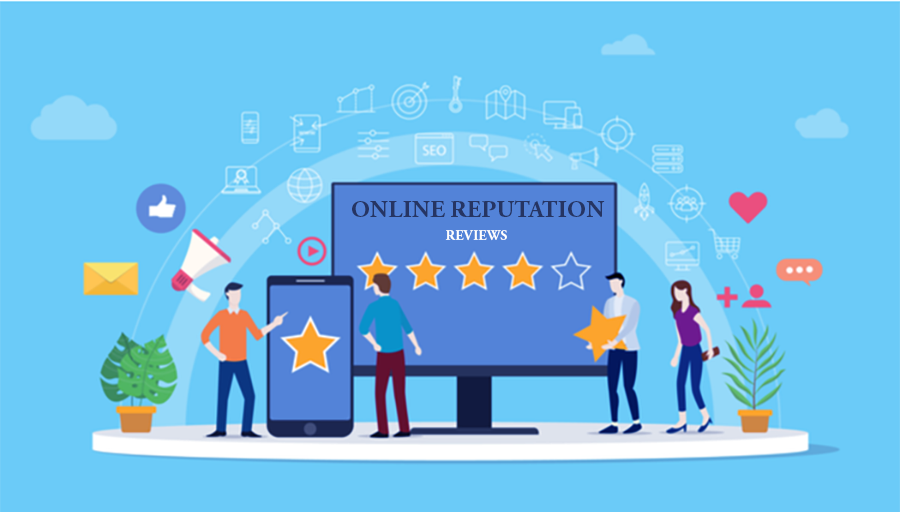What is Online Reputation Management?
Online Reputation Management (ORM) refers to the process of influencing and controlling the perception of an individual or brand on the internet. The goal of ORM is to promote positive content and suppress negative content to maintain a good reputation online.
Creating and maintaining a good reputation for the company is the most important task. Customers always rely on and trust search companies that have a reputed brand. A company’s reputation purely depends upon the quality of services it provides and the quality of support it provides to its customers. In short, keeping customers satisfied makes a company reputed.
Nowadays almost every company does business offline as well as online. Managing the online reputation of the company is equally important as its offline reputation.
When a customer wants to buy a product or service, he/she goes through the reviews of the business about their products and/or services and the way they handle their customers’ issues. Negative reviews from past customers can harm the reputation of the company and can prevent the users from being potential customers. In a long run, this can harm the business very badly.
So online reputation management is extremely important to convert your business into a reputed brand. Today we will discuss certain ways that can help in the online reputation management of the company.
Online Reputation Management (ORM) and its Need:
Online reputation management is concerned with maintaining your company’s reputation in the world of the Internet. It is about how to deal with negative comments or reviews about your company’s services and/or products.
For this, you have to actively keep track of social media and the reviewing websites to check the feedback of the customers. And the negative image of the company should be handled immediately otherwise it will impact the SEO rankings and the customer base will become quite narrow which is obviously a bad sign for any business.
There is another term public relations (PR). PR is a bit different from ORM. PR is concerned with creating a positive image of the business whereas ORM is about handling the negative image of the business.
Online Reputation Management Media Channels:
For online reputation management, four kinds of media channels are used:
- Paid Media: It covers those media channels where you have to pay for the advertisement of your company, like ads on Google, YouTube, Facebook, etc. You have full control over these channels because you are paying them.
- Earned Media: It covers those media channels where your branding is done free of cost, like blogs, reviewing websites, forums, etc. These channels are not under your control.
- Shared Media: It basically covers social media channels where anyone is free to post about your company. The reviews can either be positive or negative. These media channels need to be tracked continuously and very carefully as they have the potential to damage your business.
- Owned Media: It covers the media channels which are owned by you, like your own website, blog, etc. You have full control over this media as your own it. To make these channels better, a good standard of SEO is required.
Online Reputation Management Techniques:
Let us discuss various techniques that can be useful for online reputation management:
- Provide 24 x 7 support for the customers.
- Handle customers’ queries and issues with utmost care and politeness.
- Try your best to sort out customer issues as soon as possible so that they do not have to contact you again for the same issue.
- Try to handle the negative comments and reviews in a polite way.
- Make your customers feel valued.
- Be responsive to the direct messages sent by customers, otherwise, the customers will be forced to spit out their anger publicly.
- Never ignore negative comments done by the customers and handle them appropriately.
- Take good care of those customers who post negative reviews.
- Publicly apologize for those incidents that happened with the customers at your stores.
- Try to stay at the top of the search engine results with the help of good SEO, otherwise, your competitors’ sponsored ads will take that place even if your company name is searched directly.
- Make use of automated ORM tools, like Google Alerts, to keep track of the reviews your company is getting and handle them ASAP.
- Encourage your customers in a positive way to leave good feedback about you.
- Select only those influencers that hold a good reputation.
ORM strategies
Monitoring: Keeping track of what is being said about you or your brand online.
Content creation: Producing and publishing positive and relevant content to push down negative content.
Responding to negative reviews: Addressing negative comments, reviews, and feedback to show that you are actively engaged with your audience.
Influencer outreach: Working with influencers and bloggers to promote positive content and messages about your brand.
Search engine optimization (SEO): Improving the visibility of positive content by optimizing it for search engines.
ORM is important because what people see about you or your brand online can have a significant impact on their opinion and ultimately, their decision to engage with you or your products/services. Therefore, it’s crucial to have a solid ORM strategy in place to manage and protect your online reputation.







